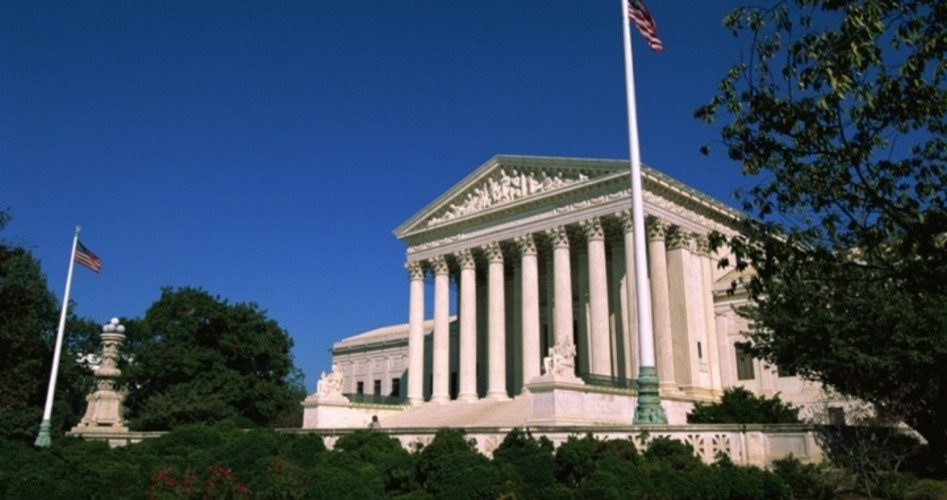
On Monday the Supreme Court heard oral arguments in a case highlighting another of President Obama’s attempts to exalt himself above the Constitution and make his word the only law.
One of the central questions facing the justices in the case of Noel Canning v. National Relations Labor Board (NLRB) is when is a recess not a recess.
President Obama appointed members to the NLRB without the consent of the Senate, claiming the Senate was in recess, though the Senate viewed itself as being in session. When the Senate actually is in recess, the Constitution allows the president to appoint officials without consent of the Senate.
Marshall Babson is uniquely qualified to analyze the Noel Canning case. He is a noted labor relations attorney, a veteran observer of the Supreme Court, and a former member of the National Labor Relations Board. Babson was in the courtroom Monday as the nine justices heard arguments for and against the claim that President Obama exceeded the appointment power granted in the Constitution.
{modulepos inner_text_ad}
In an interview with The New American, Babson described the justices as extraordinarily active in questioning the parties in the case. “They [the justices] are very engaged in this. This separation of powers issue is fundamental and compelling and if any issue was going to garner their attention, this certainly would be it,” Babson said.
The broader constitutional issue as Babson sees it is, when it comes to the president’s power to appoint executive branch officials during a Senate recess, may the president unilaterally decide when the Senate is in recess or does that power reside exclusively within the Senate itself?
Noel Canning’s road to the Supreme Court began when President Obama chose to disregard the Senate’s sense of its status (whether in recess or not) and, relying on the appointments clause, to fill vacancies on the National Labor Relations Board without Senate advice and consent.
In January 2012, President Obama used recess appointments to fill three seats on the National Labor Relations Board, arguing that the appointments were made in complete compliance with his Article II powers.
The president’s going to have a long row to hoe to convince a majority of the justices that he didn’t violate the limits of that provision, however, when he chose to place his own will above the Senate’s claim that it was indeed in session.
“The general consensus for those of us who’ve done this for some time is that it was difficult to find support for the president’s view in this argument,” Babson observed.
Does that mean the case against the president is a slam dunk?
“If the Court narrows the D.C. Circuit Court’s holding in the Noel Canning case, if they narrow the basis of the rationale, it very well could end up being a lopsided vote, if not 9-0, 7-2, or something like that,” he added. In January 2013, a three-judge panel of the U.S. Court of Appeals for the District of Columbia Circuit held that the recess appointments violated Article II, Section 2 of the Constitution, the so-called Appointments Clause.
This clause states that the president shall:
nominate, and by and with the Advice and Consent of the Senate, shall appoint Ambassadors, other public Ministers and Consuls, Judges of the supreme Court, and all other Officers of the United States, whose Appointments are not herein otherwise provided for, and which shall be established by Law.
The majority of the D.C. Appeals Court held that President Obama exceeded his Article II powers in making these appointments:
The [NLRB] conceded at oral argument that the appointments at issue were not made during the intersession recess: the President made his three appointments to the Board on January 4, 2012, after Congress began a new session on January 3 and while that new session continued. Considering the text, history, and structure of the Constitution, these appointments were invalid from their inception. Because the Board lacked a quorum of three members when it issued its decision in this case on February 8, 2012, its decision must be vacated. [Citations contained in the opinion have been omitted in this article.]
The case came to the D.C. Court from an appeal of a lower court ruling in a case filed in 2011 by the Noel Canning Company in Yakima, Washington. In that year, Noel Canning — a Pepsi bottling company — was hammering out a contract with Teamsters Local 760. The Teamsters claimed that they entered into a valid verbal agreement with the company. The company denied this claim and subsequently, a administrative law judge ruled in favor of the union.
On February 8, 2012, about a month after President Obama’s controversial recess appointments to the NLRB, that board upheld the administrative law judge’s decision and requested that a federal court order the decision to be executed.
Noel Canning responded, asking the court to overturn the decision, arguing that the president’s appointments to the NLRB were unconstitutional because the Senate was not in recess. Therefore, Noel Canning claims, there was no legally required quorum in the NLRB decision — thus it is unlawful.
The Obama administration based its argument in favor of the recess appointments on an alternate — and now rejected — interpretation of the Appointments Clause. Now, the Supreme Court will decided which definition of “recess” is the constitutional definition.
The analysis seems straightforward.
The plain language of the clause in question authorizes the president to make appointments when the Senate is in recess. If such is the case, then the president is within the sphere of his constitutionally enumerated powers to fill a vacancy that will be valid until the end of the next congressional session.
Article II also makes it clear that the Senate must already be in recess in order for an appointment made in its absence to be valid. Here’s where President Obama’s actions seem to part ways with the Constitution.
Not surprisingly, though, Attorney General Eric Holder defended the president’s questionable appointments. In a memo dated January 6, 2012, DOJ officials cited various scholarly and bureaucratic interpretations of the so-called Recess Appointment Clause of Article II in order to buttress their opinion:
This Office has consistently advised that “a recess during a session of the Senate, at least if it is sufficient length, can be a ‘Recess’ within the meaning of the Recess Appointments Clause” during which the President may exercise his power to fill vacant offices.
Although the Senate will have held pro forma sessions regularly from January 3 through January 23, in our judgment, those sessions do not interrupt the intrasession recess in a manner that would preclude the President from determining that the Senate remains unavailable throughout to “‘receive communications from the President or participate as a body in making appointments.’”
Thus, the President has the authority under the Recess Appointments Clause to make appointments during this period.
In other words, the Justice Department memo echoes President Obama’s argument that the business conducted by the Senate between January 3 and 23 was conducted pro forma and thus does not qualify as an interruption of the recess started by the vote to adjourn taken on December 17, 2011. In President Obama’s opinion, not only does he get to pick the appointees, but he gets to decide whether they need to be approved by the Senate.
The Founders felt otherwise. In The Federalist, No. 76, Alexander Hamilton explains that the Constitution “requires” the cooperation of the Senate in appointments in order to “check” the president and “to prevent the appointment of unfit characters”; and that “the necessity of its [the Senate’s] co-operation, in the business of appointments, will be a considerable and salutary restraint upon the conduct of that magistrate [the president].”
Addressing the issues underlying the key issues facing the Supreme Court in the Canning case, Hamilton, in The Federalist, 68, wrote specifically about the Recess Appointments Clause:
The ordinary power of appointment is confided to the president and senate jointly, and can therefore only be exercised during the session of the senate; but, as it would have been improper to oblige this body to be continually in session for the appointment of officers; and as vacancies might happen in their recess, which it might be necessary for the public service to fill without delay, the succeeding clause is evidently intended to authorize the president, singly, to make temporary appointments “during the recess of the senate, by granting commissions which should expire at the end of their next session.
What, then, was the role the Senate was designed to play in the nomination and appointment process? Again, Alexander Hamilton explains the relationship in The Federalist:
To what purpose then require the co-operation of the senate? I answer, that the necessity of their concurrence would have a powerful, though in general, a silent operation. It would be an excellent check upon a spirit of favoritism in the president, and would tend greatly to prevent the appointment of unfit characters from state prejudice, from family connexion, from personal attachment, or from a view to popularity. In addition to this, it would be an efficacious source of stability in the administration.
As described by Marshall Babson, the president’s position is tenuous at best and not an easy one to defend. In his learned opinion, the Court need not tackle the thornier question of when a break by the Senate is intrasession or intersession.
Babson believes, judging from the tone and content of the justices’ questions, the Supreme Court will likely decide that the limits on the president’s power to fill executive branch vacancies during a Senate recess is a constitutional issue, not a political one, thus making it easier for the various factions on the bench to unite in a one-sided vote.
That said, Babson warns “it’s always hazardous business to predict what the Court’s going to do.”
The two sides will find out what the Supreme Court decides to do when the ruling is handed down sometime in the late spring or early summer.
Joe A. Wolverton, II, J.D. is a correspondent for The New American and travels frequently nationwide speaking on topics of nullification, the NDAA, the Second Amendment, and the surveillance state. He is the co-founder of Liberty Rising, an educational endeavor aimed at promoting and preserving the Constitution. Follow him on Twitter @TNAJoeWolverton and he can be reached at [email protected].



